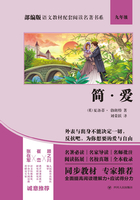`You wrong me cruelly,' answered he: `I have shared but little of Mr Huntingdon's society, for the last few weeks; and as for his tastes and occupations, they are quite beyond me--lonely wanderer as I am. Where I have but sipped and tasted, he drains the cup to the dregs; and if ever for a moment I have sought to drown the voice of reflection in madness and folly, or if I have wasted too much of my time and talents among reckless and dissipated companions, God knows I would gladly renounce the entirely and for ever, if I had but half the blessings that man so thanklessly casts behind his back--but half the inducements to virtue and domestic, orderly habits that he despises--but such a home, and such a partner to share it!--It is infamous!' he muttered, between his teeth. `And don't think, Mrs Huntingdon,' he added, aloud, `that I could be guilty of inciting him to persevere in his present pursuits: on the contrary, I have remonstrated with him again and again; I have frequently expressed my surprise at his conduct and reminded him of his duties and his privileges--but to no purpose; he only--`'
`Enough, Mr Hargrave; you ought to be aware that whatever my husband's faults may be, it can only aggravate the evil for me to hear them from a stranger's lips.'
` Am I then a stranger?' said he, in a sorrowful tone. `I am your nearest neighbour, your son's godfather, and your husband's friend: may I not be your's also?'
`Intimate acquaintance must precede real friendship: I know but little of you, Mr Hargrave, except from report.'
`Have you then forgotten the six or seven weeks I spent under your roof last autumn? I have not forgotten them. And I know enough of you, Mrs Huntingdon, to think that your husband is the most enviable man in the world, and I should be the next if you would deem me worthy of your friendship.'
`If you knew more of me, you would not think it-or if you did, you would not say it, and expect me to be flattered by the compliment.'
I stepped backward as I spoke. He saw that I wished the conversation to end; and immediately taking the hint, he gravely bowed, wished me good evening, and turned his horse towards the road. He appeared grieved and hurt at my unkind reception of his sympathizing overtures. I was not sure that I had done right in speaking so harshly to him; but at the time, I had felt irritated--almost insulted--by his conduct; it seemed as if he was prig upon the absence and neglect of my husband, and insinuating even more than the truth against him.
Rachel had moved on, during our conversation, to some yards' distance, He rode up to her, and asked to see the child, He took it carefully into his arms, looked upon it with an almost paternal smile, and I heard him say, as I approached--`And this, too, he has forsaken!'
He then tenderly kissed it, and restored it to the gratified nurse.
`Are you fond of children, Mr Hargrave?' said I, a little softened towards him.
`Not in general,' he replied; `but that is such a sweet child--and so like its mother,' he added, in a lower tone.
`You are mistaken there; it is its father it resembles.'
`Am I not right, nurse?' said he, appealing to Rachel.
`I think, sir, there's a bit of both,' she replied, He departed; and Rachel pronounced him a very nice gentle man.
I had still my doubts on the subject.














